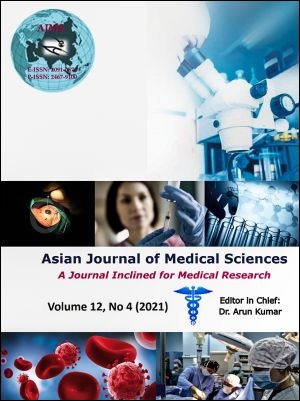The human vaginal microbial community dysbiosis contributes to the urinary tract infections during pregnancy: Case study of Gisenyi District Hospital, Rwanda
Keywords:
Microbiota, urinary tract infections, microorganisms, pregnancyAbstract
Background: Urinary tract Infections (UTIs) are the common infections during pregnancy. About 150 million UTIs occur every year globally, and 30% is attributed to pregnant women.
Aims and Objective: The study was carried out to observe the association with vaginal microbial community imbalance and urinary tract infections among pregnant women.
Materials and Methods: A total of 80 pregnant women were recruited. Of the 80 women, 40 were pregnant with UTI, and the remaining 40 were women without UTI. About 80 vaginal swab samples were collected and transported to INES clinical microbiology laboratory for microbiological analysis. Laboratory techniques including culture, gram stain, and biochemical tests were performed. ANOVA-2 was used for comparison, while chi square (χ2) was used to test for association.
Results: E. coli was predominant among women with UTIs while Lactobacilli predominated among women without UTIs. There was a statistical significance association with vaginal microbial community imbalance and urinary tract infection among pregnant women to Escherichia coli (χ2=9.97, p=0.0015), Staphylococcus epidermidis (χ2=5.12, p=0.023), Proteus spp (χ2=4.96, P=0.025), Citrobacter spp (χ2=32.51, P<0.00001), Streptococcus pyogenes (χ2=5.11, P=0.023), Staphylococcus sapropyticus (χ2=4.3, p=0.038) and Lactobacilli species (χ2=13.7, p=0.00021). The overall association (χ2=94.879, p<0.00001) with all isolated microorganisms and urinary tract infections was statistically significant. The odd ratio of pathogenic microorganisms to non-pathogenic was OR=4.98>1. For ANOVA-2, there was a higher microbial variation or differences among women with UTIs (F=7.241842) compared to women without UTIs (F= 4.71 ) in pregnancy trimesters.
Conclusion: Pregnancy is associated with vaginal microbial community imbalances which predispose women to urinary tract infections. Pregnant women should seek for medical assistance during pregnancy for early detection of urinary tract infections.
Downloads
Downloads
Published
How to Cite
Issue
Section
License
Authors who publish with this journal agree to the following terms:
- The journal holds copyright and publishes the work under a Creative Commons CC-BY-NC license that permits use, distribution and reprduction in any medium, provided the original work is properly cited and is not used for commercial purposes. The journal should be recognised as the original publisher of this work.
- Authors are able to enter into separate, additional contractual arrangements for the non-exclusive distribution of the journal's published version of the work (e.g., post it to an institutional repository or publish it in a book), with an acknowledgement of its initial publication in this journal.
- Authors are permitted and encouraged to post their work online (e.g., in institutional repositories or on their website) prior to and during the submission process, as it can lead to productive exchanges, as well as earlier and greater citation of published work (See The Effect of Open Access).




